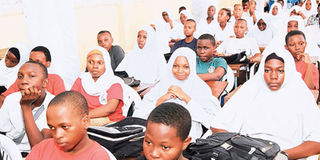Novel idea to save teenage girls

Secondary schoolgirls attend a seminar on curbing teenage pregnancy in Temeke, Dar es Salaam. Women and Development (Wama) and Engender Health organised the event, which was funded by the United States Agency for International Development.PHOTO|FILE
What you need to know:
- Class for Every One (C4E) has advised Tanzania to use a participatory plan involving parents and teachers to reduce the problem. C4E director Yoko Shimpuku said the Japanese model was based on cooperation of teachers, parents and the community to ensure children is safe from actions that are the source of teen pregnancies.
Korogwe. A Japanese organisation has come up with a novel idea to tackle teenage pregnancy in Tanzania.
Class for Every One (C4E) has advised Tanzania to use a participatory plan involving parents and teachers to reduce the problem. C4E director Yoko Shimpuku said the Japanese model was based on cooperation of teachers, parents and the community to ensure children is safe from actions that are the source of teen pregnancies.
Prof Yoko told a seminar dubbed ‘Uhuru Mobile Library’ organised by C4e and Tanzanian Youth Development Organisation here that the model had proved effective in reducing teen age pregnancies.
Over the past decade more than 55,000 Tanzania pregnant schoolgirls have been expelled from school, according to a 2013 report by the Centre for Reproductive Rights.
Recently, teen pregnancies caused a furore after President John Magufuli declared that he would not allow pregnant girls back to school despite calls from various activists to allow them.
Speaking in Chalinze, Coast Region, in June, President Magufuli said that girls would be too distracted to concentrate on their studies if they had a child, and their presence would be a bad influence on other girls.
“After calculating some few mathematics, she’d be asking the teacher in the classroom ‘Let me go out and breastfeed my crying baby,’” he said.
“As long as I am president no pregnant student will be allowed to return to school … After getting pregnant, you are done,” he told a rally. A law dating from the 1960s bans young mothers from attending public schools in Tanzania.
“I believe that the Japanese model would be productive in Tanzania because it focuses on every party -- the teacher, the parent or guardian and the community -- recognising that the security of the child is one of their responsibilities and that everybody has the right to take action as a parent,” Prof Yoko emphasised.
He said the project was proposed after a study conducted by Global Earth in 2011 which found that 8,000 girls cut short their academic pursuits due to early pregnancies.
According to him, C4E aims at creating a society where children can fully demonstrate their values no matter what kind of place they are in the world. “C4E is actively engaged in mission to create equal opportunities for education in developing countries,” he said.
To achieve Sustainable Development Goals by 2030, the organisation promotes the use of solar panels and provides high quality ICT education opportunities to children in 100 countries in Asia and Africa, especially in non-electrified areas.
“Due to the lack of knowledge about sex and life, we aim at solving the problem with the idea of mobile libraries,” he said, stressing that many girls do not want to get pregnant at elementary and junior high school levels.
Among the digital picture books the project delivers is ‘Tatu na Mbili’ (Swahili picture book with the theme of girls’ unwanted pregnancy)” produced by Shinto. Children will read this picture book, share impressions, and discuss preventive measures to deepen their thoughts on sexuality, he said.
New Rural Children Foundation coordinator Nicholaus Shemsanga said 42 primary and 15 secondary school teachers had been trained in a two-year pilot project being executed by the organisation. He said the organisation expected the teachers to spearhead a campaign against teen pregnancies.
Shemsanga said that the project, which commenced in 2019 has undertaken
A number of activities have been undertaken. They include conducting a study in all schools in Korogwe and providing education on teen physical changes to give the schoolchildren the ability to recognise those changes and enable them to avoid problems that would cut short their studies.
The activities have been conducted under the Reproductive Health Education. “The Uhuru Mobile Library distributed books and uses video shows to reach these children in schools where the project is being implemented,” said Mr Shemsanga.
The teachers speak of challenges in reducing teen pregnancies. They include policies that force them to use one book and a community that is well responsible in the children care.
Opening the seminar, Korogwe District Council chairman Charles Mweta called on teachers to use the knowledge they got for the training to tackle teen pregnancies.
The seminar was sponsored by the Japanese International Cooperation Agency.




